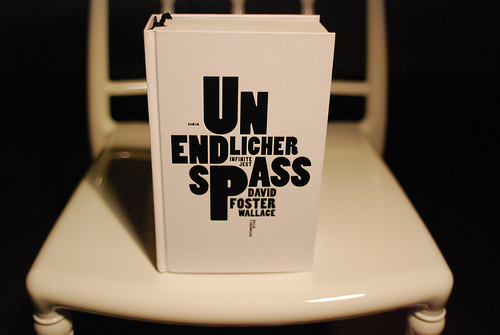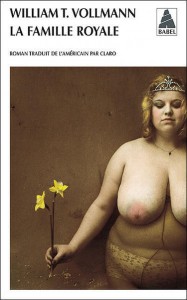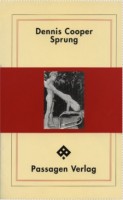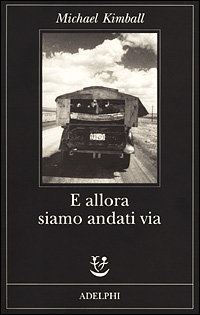20 Important Books in Other Languages; or, “a list always growing longer”

A post re:– neither repost nor riposte–Blake’s wichtige Liste and (only at first) about Infinite Jest in German. Maybe a chair is a good metaphor for who gets translated. Have you been translated? Have the Important Writers on Blake’s list? And not 25 because Saramago, Ouredník, and Zizek are already others, Ben Lerner’s a poet, Aase Berg’s both, and I’ll write about poets in translation and translation in poets at an other time.
Not sure if anyone went there during all the well DFW grammar talk (thanks, Amy), but imagine translating, say, Oblivion. Good that one of Wallace’s German translators, Ulrich Blumenbach, did just that, presumably (it first appeared in 2006), while whittling away at Infinite Jest, which took him six years and has had, as Unendlicher Spass (literally, the less Shakespearean Unending Fun), endless success: ten times the expected five grand copies have been sold since it appeared at the end of August, on the heels of Infinite Summer, which the publisher, KiWi, has translated too, as 100 Days of Infinite Jest (in German–it ended on 12-1).
In an interview with Der Spiegel, Blumenbach (pictured–in German) regrets that the author never answered his many questions, “a list always growing longer”: it seems Wallace had grown weary of taking translator’s queries, and, according to The Complete Review’s useful paraphrase of a slippery summary (still looking for the original source), considered the Spanish La broma infinita (tr. Calvo and Covian | Mondadori, 2002) and the Italian Infinite Jest (Nesi w/ Villoresi and Giua | Einaudi, 2006) and apparently other attempts (anyone know more?) to have “all failed, more or less.”
 In a warm war, France is responding with (900 pp. of) Vollmann’s Rising (not translated by the great Claro, see below, who did six previous tomes, but by one Jean-Paul Mourlon, translator, it seems, of Jimmy Carter and Hilary Clinton). There’s also German Vollmann (3 titles), Spanish Vollmann (3 more), Japanese Vollmann (2), Greek Vollmann (2), and Czech Vollmann, all (not counting the French) with only one title (Butterfly Stories) repeated.
In a warm war, France is responding with (900 pp. of) Vollmann’s Rising (not translated by the great Claro, see below, who did six previous tomes, but by one Jean-Paul Mourlon, translator, it seems, of Jimmy Carter and Hilary Clinton). There’s also German Vollmann (3 titles), Spanish Vollmann (3 more), Japanese Vollmann (2), Greek Vollmann (2), and Czech Vollmann, all (not counting the French) with only one title (Butterfly Stories) repeated.
American Genius is only a Great American Novel for now (does it even have a British publisher?), despite Tillman’s first book of stories, Tagebuch einer Masochisten, having appeared in Germany in 1986, four years before her first collection in English, Absence Makes the Heart, and the year before her first novel, Haunted Houses (Verwunschene Häuser, 1988); two more novels followed, though no book has appeared “aus dem Amerikanischen” (from the American) since No Lease on Life / Die Mieterin (1998), which came out in Chinese in 2000. Also translated: two novels (Serbian, 1990; Portuguese, 1996), a book of stories (French, 2005), and her biography of Jeannette Watson and Books & Co. (Japanese, 2002).
 Pastoralia came out in Barcelona alone twice (Spanish, Catalan) in 2001, and also that year in Amsterdam; in France and Germany (home of Die furchtbar hartnäckigen Gapper von Frip and BürgerKriegsLand fast am Ende, recently
Pastoralia came out in Barcelona alone twice (Spanish, Catalan) in 2001, and also that year in Amsterdam; in France and Germany (home of Die furchtbar hartnäckigen Gapper von Frip and BürgerKriegsLand fast am Ende, recently  repackaged as Bounty-Land) the next, and in Japan in 2004. More Saunders in Czech and Italian.
repackaged as Bounty-Land) the next, and in Japan in 2004. More Saunders in Czech and Italian.
Nicholson Baker has been translated into 20 languages (good for languages! Updike ve Ben in Turkish, Vox in Bengali) and Human Smoke is just out in French, German, Italian, and Spanish (Humo humano).
David Markson was something of a surprise. That This is Not a Novel has not been translated into the language of Magritte seems wrong, tho Wittgenstein’s Mistress has (also Spanish), and The Last Novel is called, wonderfully, Arrêter d’écrire (Stop–or is it only To stop?–writing, translated by Claro, see below Evenson). In German, only three early crime novels, and not since 1972. Dalkey Archive should do some bartering.
 2008 was a good year for Kelly Link: Majikku fo biginazu (Japanese: ok, 2007), Magie pro zacátecníky (Czech), Chobojarul wihan mabop (Korean), Magia dla poczatkucych (Polish), as well as a second Czech collection and 400 page French and German collections.
2008 was a good year for Kelly Link: Majikku fo biginazu (Japanese: ok, 2007), Magie pro zacátecníky (Czech), Chobojarul wihan mabop (Korean), Magia dla poczatkucych (Polish), as well as a second Czech collection and 400 page French and German collections.
There’s no Venus Fahrweg, but Home Land exists in French (Douce Amérique) and Sp anish (Hogar, dulce hogar) and The Subject Steve became O Paciente Steve (Portuguese) and Object Steve (Объект Стив): and they’re gonna love The Ask in Russia (in all the lands and seas) if Lipsyte’s reading here earlier this month was as awestriking as it was.
anish (Hogar, dulce hogar) and The Subject Steve became O Paciente Steve (Portuguese) and Object Steve (Объект Стив): and they’re gonna love The Ask in Russia (in all the lands and seas) if Lipsyte’s reading here earlier this month was as awestriking as it was.
Tell Me, which includes some stories from Why Did I Ever, is in Italian, and Robison has a book of stories (1988) and a novel (1993) in French. Why have I never read her, and where should I start?
Has Gary Lutz really not been translated? Surely a story somewhere? Anyone? Who’s made a pilgrimage to OU–why OU?–to  read Ordinary Sorrows?
read Ordinary Sorrows?
Chaperos. Salopes. The Sluts in Spanish and French. Cooper exists in a dozen languages, w/ almost that many titles in French. Seems oddly awesome that his sole German language publisher (six books in ten years, last in 2003) is Austrian (they’re also Zizek’s). And so it seems possible that Cooper’s novels are more readily available in Austria than Bernhard’s. Wish Die Flitscherl existed. Someone petition the Austrian Cultural Forum.
The Open Curtain becomes Inversion in France, where Contagion and Last Days have also landed. Surprised there are no German (or any other) translations. Too bad Dürrenmatt died in 1990.
Now’s probably the time to give special mention to Christophe Claro–who frenched Contagion. Known as just(e) Claro, he’s translated Acker, Baker, Barth, Cooper, Gaddis, Gass, Leyner, Marcus, Markson (see above), Pynchon (Contr e-jour, no less), Rees, Rushdie, Selby, Jr., Vollman (six books!)–anyone read his only book in English, Evenson’s translation of Chair électrique, Electric Flesh (Soft Skull, 2006)?
e-jour, no less), Rees, Rushdie, Selby, Jr., Vollman (six books!)–anyone read his only book in English, Evenson’s translation of Chair électrique, Electric Flesh (Soft Skull, 2006)?
Our own Claro, Lydia Davis, has (just!?) two very recent (Break It Down in 2006 and 2009’s tantalizingly titled Kafka aux fourneaux) story collections in French, in which also The End of the Story became C’est fini (1998). One title each in Germany (Almost No Memory appeared in Japan (2005) and Germany (2008). And then there’s Samuel Johnson está indignado. For someone who’s given us so much (don’t miss her Peter Altenberg in NOON–& why not Walser?–plus can’t wait for her Madame Bovary–in the meantime, there’s No Tomorrow), and who writes simple enough sentences (on the surface), why not more? Who will translate the translator?
You would think Dear Everybody would get picked up–probably it has, surely it will–especially since The Way The Family Got Away has gone into Italian, Dutch, German, Portuguese, Spanish, and–soon?–Hebrew. May Michael Kimball write 10 books that get translated into six languages. Or better, 60 in 60.
Someone should look at how long it’s taken some classic COLLECTEDs to get translated…Hempel’s first book, Reasons to Live went quickly into Spanish and French, in which her second book also appeared. There have been stories in German since the early 90s at least, and presumably in other languages, but nothing since. Why not?
Got excited when World Cat turned up Ben Marcus in Malayalam (wish I could find a reading by agog poet K. Satchidanandan himself–best I could do is that here you can hear his language), but it looks like Claro’s rendering of Notable American Women as Le silence selon Jane Dark is all there is…
Someone’s gotta translate John D’Agata, wiselike Matthew Derby, it’s times for Vanessa Place, the difficulties posed by La Medusa begin with the title…) And, fast, imagine Kamby Bolongo Mean River in Alaskan.
Tags: brian evenson, david foster wallace, Dennis Cooper, gary lutz, translation

Nat, this post is unending fun. Endless success. Unrelenting summer.
Humo Humano!
This post is so gorgeously and unapologetically highbrow in all the bestest of ways. Chapeau bas!
Nat, this post is unending fun. Endless success. Unrelenting summer.
Humo Humano!
This post is so gorgeously and unapologetically highbrow in all the bestest of ways. Chapeau bas!
damn. now i want to become quadlingual
damn. now i want to become quadlingual
Thanks, Amy. I guess it is a summer. I sure was happy to find Humo Humano. I still can’t believe it. Wish I knew Spanish. And I had to hold onto my hat until a book told me what to do next. Wish I knew French. But not like, when I am reading German with slow fingers and all the dictionary doors open, and think, I wish I knew German. And not like Virginia Woolf Not Knowing Greek, no, more like, wish I could hear a little Spanish, or even just see a little French.
Thanks, Amy. I guess it is a summer. I sure was happy to find Humo Humano. I still can’t believe it. Wish I knew Spanish. And I had to hold onto my hat until a book told me what to do next. Wish I knew French. But not like, when I am reading German with slow fingers and all the dictionary doors open, and think, I wish I knew German. And not like Virginia Woolf Not Knowing Greek, no, more like, wish I could hear a little Spanish, or even just see a little French.
it. we should all learn all the languages starting with Alaskan and Blankish and Canadian and extra English. I hear tell a teacher once did tell Brad Flis, poet of Peasants (Patrick Lovelace Editions, 2–9) and builder of Model Homes (http://modelhomepage.blogspot.com/) that his poems were “in Canadian.”
it. we should all learn all the languages starting with Alaskan and Blankish and Canadian and extra English. I hear tell a teacher once did tell Brad Flis, poet of Peasants (Patrick Lovelace Editions, 2–9) and builder of Model Homes (http://modelhomepage.blogspot.com/) that his poems were “in Canadian.”
Ha, Rachel Glaser’s gonna think I’m trying to have a secret conversation with myself. For Walser & Co: read NO, and for those who entered the Heather Christle Week contest know that the winners will be announced there tomorrow.
Ha, Rachel Glaser’s gonna think I’m trying to have a secret conversation with myself. For Walser & Co: read NO, and for those who entered the Heather Christle Week contest know that the winners will be announced there tomorrow.
I wonder why DFW felt his translations were unsuccessful.
Did he have such a thorough and assured understanding of the target languages that he was able to judge the merits of the final product, or did he think that the questions posed by the translators were symptoms of larger problems in their comprehension of the text?
I wonder why DFW felt his translations were unsuccessful.
Did he have such a thorough and assured understanding of the target languages that he was able to judge the merits of the final product, or did he think that the questions posed by the translators were symptoms of larger problems in their comprehension of the text?
Yeah, I’ve seen “Unendlicher Spass”
gesternyesterday in a bookstore and I fingered in this huge work of translation. I love translations, especially comparing with originals. Like “Das Haus” vs. “House of Leaves”, which was very neat translation. Like “Densha Otoko” vs. “Train Man” (which is perhaps more difficult to translate than “Finnegans Wake” [even if you cannot compare 2chan with Joyce {I like brackets}]).So all I want to say: thank you for this article!
Yeah, I’ve seen “Unendlicher Spass”
gesternyesterday in a bookstore and I fingered in this huge work of translation. I love translations, especially comparing with originals. Like “Das Haus” vs. “House of Leaves”, which was very neat translation. Like “Densha Otoko” vs. “Train Man” (which is perhaps more difficult to translate than “Finnegans Wake” [even if you cannot compare 2chan with Joyce {I like brackets}]).So all I want to say: thank you for this article!
are there any authors who liked their translations a lot, or even more than the original? i remember hearing marquez thinks his english versions are better than the originals.
are there any authors who liked their translations a lot, or even more than the original? i remember hearing marquez thinks his english versions are better than the originals.
[…] December 17, 2009 · Leave a Comment On HTML Giant a fantastic article on the great translated, untranslated and untranslatable novels of the past few years. David Foster Wallace (interesting that Infinite Jest becomes Unendlicher Spass in Germany, Broma Infinita in Spain but remains Infinite Jest in France and Italy), William T. Vollman, Lynne Tillman (my read these days), George Saunders, Lydia Davis (brilliant translator herself), etc. etc. Read. […]
But how many authors are really able to discern the quality of a translation?
Years ago I translated into Italian an excerpt from Tao Lin’s Shoplifting From AA, would love to hear his thoughts on it.
When Beckett translated Endgame into French he took out my favorite line in the play, maybe in everything that he ever wrote: “I see a multitude, in transports of joy.” I think this was because it was too meta, as Clov says it while looking at the audience.
Great post.
When Beckett translated Endgame into French he took out my favorite line in the play, maybe in everything that he ever wrote: “I see a multitude, in transports of joy.” I think this was because it was too meta, as Clov says it while looking at the audience.
Great post.
[…] Here’s another one to add to the translations list: […]
I bet Borges liked himself better in English.
I bet Borges liked himself better in English.
Now reading the German translation I can say: it’s congenial. I say it as a non-native-English- and non-native-German-speaker.
Now reading the German translation I can say: it’s congenial. I say it as a non-native-English- and non-native-German-speaker.
that’s a start:
http://www.editions-ere.net/projet319
that’s a start:
http://www.editions-ere.net/projet319
[…] Century — This list was full of titles that I’d always meant to read, but hadn’t. HTML Giant: 20 Important Books in Other Languages — Reminded me of how Anglo/American my reading habits are. The Millions: Year in Reading […]